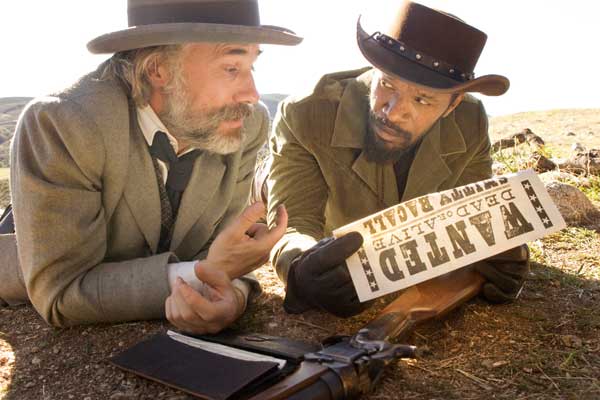Here is a Quentin Tarantino film that, like all Quentin Tarantino films, is a typical Quentin Tarantino film, in the style of Quentin Tarantino, in that he takes a familiar trope, nods at it, toys with it, pokes it about, swills it round his mouth, then blows the whole thing up. I wonder if he was like this as a little boy. I wonder if his mother ever said to him, ‘Quentin. I love you. You’re my son. But if you keep stringing the other kids along so exploitatively and then blowing everything up in their poor faces they aren’t going to want to play with you. I don’t know where you get it from. Now, go tidy your room, dear, before I slice off your ear and shoot out your stomach so blood splatters out the front, out the back and up the wall. Run along.’ The thing is, Django, which is set in the American South and takes on black slavery, is a good film, and a crazily entertaining film, until Tarantino does blow everything up, at which point it just becomes rather silly. And I didn’t want to play any more.
This is, I suppose, Tarantino’s take on the Spaghetti Western trope and that particular type of hero who uses cunning and inordinate weapons skills to see off trouble and dig himself out of holes. (Interesting Titbit Alert: the Django title is taken from a series of 1950s Italian cowboy movies whose first star, Franco Nero, turns up here in a cameo.)
Set in America a couple of years before the Civil War, our first hero is Dr Schultz (Christoph Waltz), a German bounty hunter masquerading as an itinerant dentist. (He drives a wagon with a giant molar wobbling on the roof.) Waltz, whose brilliance at a kind of playful sadism means he was surely born to play Tarantino characters, is wonderful as Schultz, who talks with an elaborate formality and is so cunning most of the joy of the first half of the film comes from seeing how he can possibly get out of the situations he gets himself into.
Anyhow, he’s tracking a gang of outlaw brothers, and on discovering a slave who knows them by sight enlists his help. The slave is Django (Jamie Foxx), first glimpsed in leg-irons and rags. Dr Schultz and Django become allies, hunting down fugitives, who, frankly, aren’t very good at hiding — how come Schultz always knows exactly where they are? — and also seeing off the Ku Klux Klan, who, in a marvellously Monty Pythonesque scene, hang around bitching about the eye holes in their hoods being too small. (I laughed my head off; I do think people sometimes forget how funny Tarantino can be, and how he can sometimes serve up fresh, unexpected pleasures.) Schultz and Django spend the winter together, bromancing away, even though Django is quite taciturn and monosyllabic. Still, they become friends and, more, Django enlists Schultz to help him find his wife, Broomhilda (Kerry Washington). After the couple tried to run away from their former plantation, it becomes apparent, they were whipped and branded — shown in horrific flashback — and Broomhilda was then sold.
Their search takes them to Candie Land, a plantation run by the monstrous fop Calvin Candie (Leonardo DiCaprio), who is into ‘mandingo wrestling’; a game where two healthy black men wrestle each other to the death, although, thankfully, Tarantino is restrained enough to not show this in any particular detail. I’m only Djoking! Of course he shows it, and of course you hear it. (I love the sound of breaking bones, personally.) At Candie Land, we also meet the most scarily vivid character of the piece: Candie’s house slave Stephen (Samuel L. Jackson). Stephen is the Uncle Tom of all Uncle Toms, a white supremacist, but black. Jackson has filled out for the role, and is bald bar a few white tufts, and you just can’t take your eyes off him. But, alas, his character makes the storyline take a swerve, away from cunning to pure blood-lust as Django is transformed into some kind of cartoonish, absurd avenging angel.
There has been some controversy about this film. The violence. The ‘N-word’ is used liberally. Is this a film a white man should be making? I don’t know about any of that but I can tell you that Django and Broomhilda could have done with an extra dimension. They are the weakest, least interesting characters by far, and really rather short-changed. Still, like I said, it’s crazily entertaining until all hell lets loose, but that’s Tarantino for you, I guess. And you must ask yourself: do I want to play?






Comments